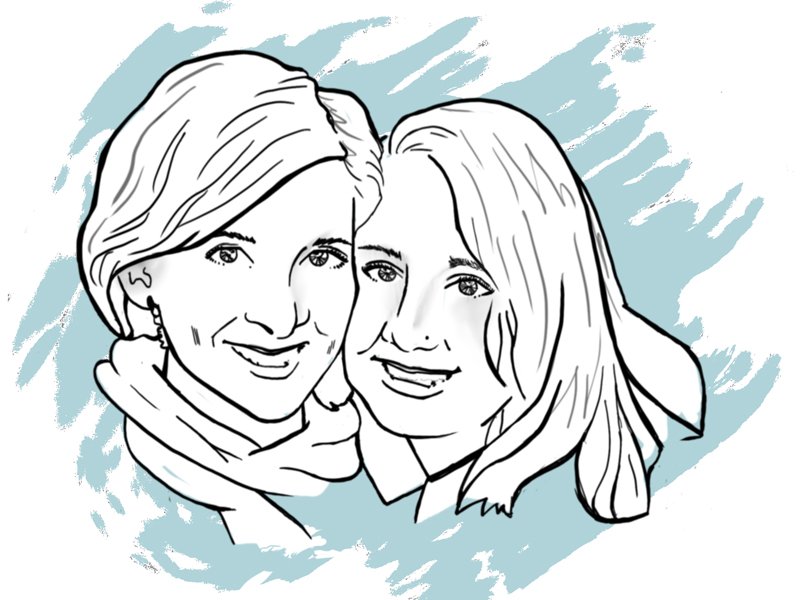Mandy and Michael Eaton turn grief into action, and Cone Health stands with them.

Adrienne Eaton’s desire to look out for the underdog took root at a young age. If she discovered an animal in distress, maybe a bird struggling in a downpour, she wanted to keep it safely on her porch until the storm passed. When it came time to choose a family dog from the greyhound rescue, Adrienne’s instructions were clear: Pick the ugly one, the one no one else will want.
Mandy Eaton, Cone Health’s chief operating officer, remembers when her 6-year-old daughter left for school one day fully dressed except for one detail: shoelaces. Adrienne had noticed a classmate with shoes too big and no laces, and she knew just how to remedy the situation.
“She was always looking out for the underdog,” Mandy recalls. “She was the most loving child, and if she loved you, you knew it. Her hugs were so tight. That was her way of giving you everything she had.”
Years later, after a routine dental surgery in her late teens, Adrienne struggled with addiction.
“She was taking an opioid and she knew it was a problem,” Mandy says. “She finished her medication and said, ‘I can't stop taking this.’”
Adrienne spent many years facing her addiction head-on. She completed inpatient treatment at the Cone Health behavioral health hospital along with 30 days at an outpatient facility, followed by living in two group homes, years of therapy, additional outpatient treatment for substance use disorder, and attendance at Alcoholics Anonymous and Narcotics Anonymous on a routine basis.
Then she celebrated 12 months of sobriety.
Shortly after reaching this milestone, individuals from her past reemerged, and there was what Mandy remembers as a “definite turn” in Adrienne’s life.
“She called from a gas station one day. A dealer she used to know had pulled up, and she was very nervous about it. I said, ‘Let’s just stay on the phone and talk and talk and talk until he leaves,’ and then he left.”
A few weeks later, the family planned to gather at their lake house for the Fourth of July. Mandy went for a run that morning, the sun blazing down on her as she anticipated Adrienne’s arrival with every step.
Later that same day, a detective phoned with devastating news. Adrienne was gone. On July 2, 2017, at just 26 years of age, she died from a drug overdose, an opioid laced with fentanyl.
“It’s hard for anyone who hasn’t personally experienced addiction to understand the depth of the trigger,” Mandy says. “Being by her side during the moments leading up to her overdose, like the one at the gas station, was hard because I couldn't appreciate what she was going through. But I could see the depth, difficulty, and pain of addiction for her, and it was real.”
Together, mental illness and drug addiction are a national and global epidemic. Even with access to standard treatments and support programs, something often is missing to help people break the cycle.
“Adrienne put in the work,” Mandy says. “She fought it hard and found her way out of the darkness multiple times. We were fortunate to have access to all the outstanding health care venues and treatments, but even that wasn't enough,” Mandy says.
That year, more than 70,000 people across the country died of a substance use disorder, and the Office of the President declared the opioid epidemic a state of emergency.
“The doctors at Cone Health have done enormous work to be very cautious of opioid prescriptions,” Mandy says. “It's dangerous, and there's a lot of pharmaceutical policy reform that still needs to happen. But it's not only there. It's in our streets. It's in our schools. It’s at our worksites. It's so easy to obtain, and that's the real challenge.”
What can we do to begin solving such a complex, widespread problem?
“For starters, we’ve got to get further upstream with prevention, and that starts with recognizing that the stigma is real,” Mandy says.
“When a family member or loved one is diagnosed with cancer or has a broken ankle, we rally around them. We feel it. We see it. We make cakes, we bring them food, we go to cancer treatments, we sit with them. But when people have mental health issues, we don't. We should be showing up for them, and we’re not.”
We also need to get creative.
“The traditional path isn’t going to get us there,” Mandy says. “We have to be willing to be innovative in how we think about mental health and we have to utilize technology and invest in research in new and different ways.”
After they lost their daughter, Mandy and her husband, Michael, spent a lot of time sitting with the grief and thinking through how to channel it into something positive.
“We had a little life insurance money that was just sitting there,” Mandy says. “But we wanted to be sure it would make a difference.”
About that time, Cone Health’s Campaign for Healthy Communities had launched, and behavioral health kept surfacing as an opportunity. “I told Michelle Schneider (chief philanthropy officer) that I saw myself innovating and making things better for the next person with mental health issues or a substance use disorder. Because behavioral health is at the core of all well-being and touches every campaign project, we became inspired.”
Mandy and Michael invited Michelle for dinner at their home in Alamance County. Michelle asked about Adrienne, what she was like, and what were some of their favorite memories. Then the three brainstormed.
“She was so thoughtful about making sure we felt fully involved in the creation of a fund to honor Adrienne, so that's what we set out to do.”
They established Adrienne’s Fund, with Mandy and Michael committing $100,000 over the first few years. A social media campaign subsequently brought in more than $30,000 from friends and family members.
Last summer, they met again at the lake, and this time Adrienne was there, in her own special way. Friends, family members and donors came to celebrate the success of the fund and to imagine the good that will come from it.
First and foremost, critical dialogue. Over the years, many people had shared with Mandy their own stories, real-life accounts that previously had been kept private.
“I thought, ‘Wow. If this fund does nothing else, maybe it will start a conversation.’ So, that became one of the calls to action at the party. We agreed to talk about mental health. We said, ‘Let’s not perpetuate the stigma. Let’s love people for who they are and recognize this as a disease, just like anything else. Let’s be leaders.’”
For those who’ve lost loved ones to mental illness and addiction, having hopes and dreams is a forever-altered experience. Mandy can envision something powerful, however, with Adrienne’s Fund being the catalyst.
“My grand vision is that more people become interested in serving in the mental health field, more people conduct research and are driven to find cures because they see what's possible,” Mandy says.
Mandy’s words evoke memories of the underdogs her daughter fought for with that determined, tender heart of hers.
“My greatest hope is that people impacted by addiction personally get involved and help us make Adrienne’s Fund a movement for our community,” Mandy adds. “The collective power of those who are impacted will be extraordinary.”
